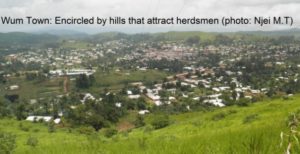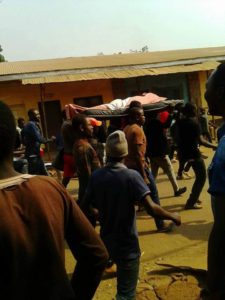THE ANGLOPHONE PROBLEM: LESSON TO MY FRANCOPHONE BROTHERS
 Recall that though both Nigeria and “La Repubique du Cameroun” promised a Federal Union with The Southern Cameroons, “La Republique du Cameroun”, being smaller than Nigeria, agreed on a FEDERAL union with The Southern Cameroons as two equal states of the Federation. “La Republique du Cameroun” pledged never to use its larger population and annex The Southern Cameroons.
Recall that though both Nigeria and “La Repubique du Cameroun” promised a Federal Union with The Southern Cameroons, “La Republique du Cameroun”, being smaller than Nigeria, agreed on a FEDERAL union with The Southern Cameroons as two equal states of the Federation. “La Republique du Cameroun” pledged never to use its larger population and annex The Southern Cameroons.
Two things happened:
1) The whip-wielding French comrades of the Federation manifested domestic truancy which led to the total destruction and subsequent dissolution of the foundation on which the Union rested and a complete repudiation of the very idea of The Southern Cameroons and “La Republique du Cameroun”.
2) Following this, was colonial imperialism, the annexation and armed occupation of The Southern Cameroons.
These two moves (overthrow of The Federal Constitution Order and the revival of “La Repubique du Cameroun”) meant the status of The Southern Cameroons have been degraded from that of a self-government of an independent state to that of a dependent territory, thus The Southern Cameroonians have become a colonised people under alien subjugation.
The May 20, 1972 Referendum was firstly UNCONSTITUTIONAL in that, it violated Article 47 of the Federal Constitution which stipulated the method of amending it. It stated that:
Any proposal for the revision of the present constitution which impair the unity and integrity of the Federation shall be inadmissible” (Federal Constitution of 1961)
Ahidjo’s hidden agenda, which was the destruction of the Federation and the subsequent assimilation of The Southern Cameroonians was revealed in the Referendum of May 20, 1972.
Since the 1972 Referendum, relationship between the Francophone and the Anglophones have never been the same. Dr John Ngu Foncha in his letter of resignation from the ruling C.P.D.M. party stated that:
“The constitution that I have held and preached as the supreme law of the land is in many respect being ignored or manipulated. People are encouraged to support a flagrant violation of the constitution by going out on marches against the existence of multiple parties”
(Foncha 1990)
The rational behind the Referendum was to destroy the culture of The Southern Cameroons and dismantle its institutions especially in the spheres of legislative government, House of Chiefs, Judiciary, Police force, economic development etc, this was in a bit to accelerate the exploitation with impunity of The Southern Cameroons.
Mr Paul Biya, placed the last nail on The Southern Cameroons casket and being Ahidjo’s well groomed and hand-picked successor, finalised Ahidjo’s diabolic agenda by unilaterally and by a mere Presidential decree promulgated law No. 80.001 of February 4, 1984 abolishing The United Republic of Cameroon and resuscitating in its place “La Republique du Cameroun”.
This unconstitutional change of the country’s name was an ACT OF SECESSION by “La Republique du Cameroun” from the original Union. Remember that the name “La Republique du Cameroun” is the name French “Cameroun” assumed when it became independent on January 1, 1960, without The Southern Cameroons, and became admitted into membership of the United Nations. It equally gained international recognised boundaries.
If this be the case, where is the identity of The Southern Cameroons?
Fon Gordi Dinka, the first President of The United Republic of Cameroon Bar Association, in reaction to this unconstitutional behaviour and in a bit to salvage the situation, bearing in mind, other accumulated grievances, addressed a petition to President Paul Biya. In the protest letter entitled THE NEW SOCIAL ORDER, Dinka accused Biya SECESSION AND ANNEXATION. He argued that by reviving the old name “La Republique du Cameroun”, which was submerged at the Foumban Conference to create a Federation with The Southern Cameroon, this means “La Republique du Cameroun” has seceded from the Union and any claim by la Republique du Cameroun to govern The Southern Cameroons means pure annexation.
Mockery and stereotyping are unavoidable features that have dug rifts between Anglophones and Francophones. This include discrimination in public services, promotions, examinations, admission into schools, mockery references and even psycho-social issues. J.N. Foncha in his resignation letter from the C.P.D.M. emphasized that:
“…the Anglophone whom I brought into the Union have been ridiculed and referred to as ‘les ennemis dans la maison’, ‘les biafrans’, ‘les tritres’… ”
In recent times, what is prevalent is “les sécessionnistes”. Such appellations are derogatory and meant to dehumanise or disenfranchise Anglophones. When Ni John Fru Ndi, an Anglophone, forcefully launched the Social Democratic Fund (S.D.F.) on May 24, 1990, the Anglophones were referred to as ‘traitors’. Also, when continuous Anglophone pressure for democracy forced The National Assembly to adopt in November the Multipartism law and Biya promulgating it into law on December 19, 1990, the Anglophones were referred to as ‘les ennemis dans la maison”.
These derogatory words on Anglophones dismiss the fact that the Anglophone problem is elitist but an issue which has eaten deep into the fabrics of the country’s grassroots.
The UN Sponsored plebiscite of February 11, 1961, is the hardcore of The Southern Cameroon question today. The plebiscite mortgaged The Southern Cameroons’ independence and reunification with “La Republique du Cameroun” that is in violation of UN Resolution 1514 if 1960 on the granting of independence to all colonial and trust territories.
The plebiscite was based on two obnoxious clauses that denied The Southern Cameroons of its right to sovereign independence. The two alternatives were:
a) Do you wish to achieve independence by joining the independent “La Republique du Cameroun?”
or
b) Do you wish to achieve independence by joining The Federal Republic of Nigeria?
Reactions from The Southern Cameroons had advocated a third option which was that of total independence. Unfortunately, the UN rejected the third option.
The UN had pushed The Southern Cameroons into this mess by limiting her options for Independence and failing to respect its own UN Resolution 1514 of 1960. The funny UN proceedings and non-implementations of the UN Resolution 1608 approving a post plebiscite conference had frustrated The Southern Cameroons’ right to self-determination.
The said UN Resolution appointed a commission of three constitutional experts to be nominated one from “La Republique du Cameroun”, another from The Southern Cameroons, enabling then to form a Federal United Republique as contained in the UN Resolution 1608(XV) of 1961.
At this time, “La Republique du Cameroun” was already independent while The Southern Cameroons was enjoying regional status in Nigeria. Their reasons for this committee of experts on constitutional matters was to mediate between “La Republique du Cameroun” and The Southern Cameroons whose independence was to be assumed at the unification, thus the UN intervention was to assure the balance of power.
Unfortunately, the UN and Britain, the administering powers failed to attend the conference while the French supported and advised the Francophone Republic. The UN and British absence was a betrayal of The Southern Cameroonian.
The two questions were against the spirit of the Mamfe Conference which resolved that The Southern Cameroons should first be independent before thinking of re-unification. The resolution of The Mamfe Conference was effectively placed before the UN but was ignored. The plebiscite was therefore something that was forced down the throat of The Southern Cameroonians and is still hunting them today.
Dr J.N. Foncha, The Southern Cameroons Prime Minister who led The Southern Cameroons to independence in his letter to the British, the UN and member countries titled “Startling Revelation from British Declassified documents on The Southern Cameroons” revealed that:
“There is an increasing movement in The Southern Cameroons in favour of a third choice in plebiscite-total independence with United Kingdom Aid. We have not supported this proposition when I wrote my letter 1519/1/60 of June 7, about Cameroons, I had not seen Hell’s letter 1847/11230 of May 25 to Kale about the third question… The terms of the last sentence of that letter cause me concern…”(Declassified UK document).
There is no legal union of the Cameroons, Yaounde seceded since 1984. This means, the territory of the Southern Cameroons is occupied, its citizens annexed and its resources plundered. Only a return to the Pre-1972 status (Federation) can salvage this problem, failure of which will lead to Independence of the Southern Cameroons as Ambazonia Republic.
By Dr.Tee Ebogo-Ngwa
Yaounde

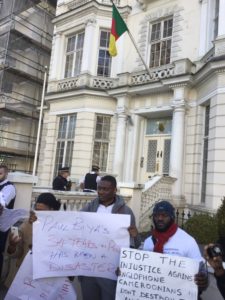

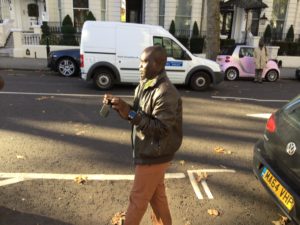
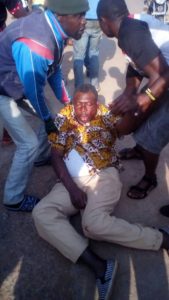 We hail and salute the nationalistic consciousness and patriotism demonstrated by all the people – men, women, youths and students – of British Southern Cameroons in solidarity with the Common Law Lawyers and the ongoing strike declared by the Teachers Trade Unions.
We hail and salute the nationalistic consciousness and patriotism demonstrated by all the people – men, women, youths and students – of British Southern Cameroons in solidarity with the Common Law Lawyers and the ongoing strike declared by the Teachers Trade Unions.





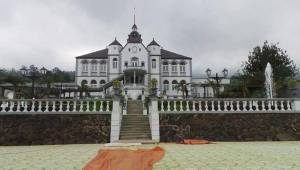 1. The Southern Cameroons has a surface area of 43,000 sq. km and a current population of about 6 million people. It is thus demographically bigger than at least 60 UN and 18 AU Member States, and spatially bigger than at least 30 UN and 12 AU Member States. Located in the ‘armpit’ of Africa, it is sandwiched between Nigeria and Republique du Cameroun like a wedge between West Africa and what in effect is still French Equatorial Africa. It has frontiers to the west and north with Nigeria, to the east with Republique du Cameroun, and to the south with the Equatoria Guinean Island of Bioko. The borders are well attested by international boundary treaties.
1. The Southern Cameroons has a surface area of 43,000 sq. km and a current population of about 6 million people. It is thus demographically bigger than at least 60 UN and 18 AU Member States, and spatially bigger than at least 30 UN and 12 AU Member States. Located in the ‘armpit’ of Africa, it is sandwiched between Nigeria and Republique du Cameroun like a wedge between West Africa and what in effect is still French Equatorial Africa. It has frontiers to the west and north with Nigeria, to the east with Republique du Cameroun, and to the south with the Equatoria Guinean Island of Bioko. The borders are well attested by international boundary treaties.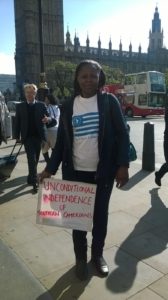

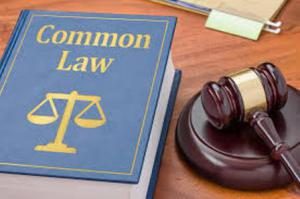 Citizens from former British Southern Cameroons have been wondering what is common law especially those who have not been privy to study law in the University. Cameroon has two types of legal system. The Common and Civil Law. In this article, Donatus Wan-Obi, former UB Student Union Chairman and a legal mind himself, gave the ABC of the common law in the most simple terms for our understanding. It is important that when we talk about Common Law and when we support our lawyers, we should be aware of what we are saying. These short questions and responses will help us gather.
Citizens from former British Southern Cameroons have been wondering what is common law especially those who have not been privy to study law in the University. Cameroon has two types of legal system. The Common and Civil Law. In this article, Donatus Wan-Obi, former UB Student Union Chairman and a legal mind himself, gave the ABC of the common law in the most simple terms for our understanding. It is important that when we talk about Common Law and when we support our lawyers, we should be aware of what we are saying. These short questions and responses will help us gather.
